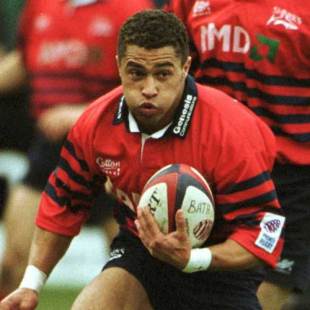October 17 down the years
Racism to the fore in rugby's early days
Jason Robinson joined Sale on this day in 2000
© Getty Images
1906
When the touring South Africans realised Devon had picked Jeremy Peters, the first black man to play for England, they refused to take to the field and Devon refused to drop him. With 18,000 crammed into the ground at Plymouth, a major incident was only avoided when the South African High Commissioner came down from the stands and ordered them to play. One of the Springboks loudly said that he would "kill" Peters. "That's alright," a Devon player replied. "We've been trying to do that for years." South Africa won 22-6 and their racism was successful in the longer term. Peters was not picked by England for the Test; he was not even invited to the trial match.
2000
Rugby league winger Jason Robinson switched codes and signed a five-year deal with ambitious Premiership side Sale Sharks. Robinson made over 300 appearances in a wildly successful spell with Wigan, scoring 182 tries. "I decided to switch codes now as it was now or never," he said. "If I'm going to do something I wanted to do it while I'm in good form and a good age. I want to give it my all, that is why I have made this decision." He made his international debut months later against Italy and was selected for the 2001 British & Irish Lions tour to Australia, playing all three Test matches after only three replacement appearances for England. In 2003 he scored a try in the Rugby World Cup final as England won the sport's top prize.
2007
English referee Wayne Barnes was given a pass mark by an IRB panel for his controversial performance with the whistle in France's Rugby World Cup quarter-final victory over New Zealand in Cardiff. The panel found that Barnes and his touch-judges, Jonathan Kaplan and Tony Spreadbury, made three serious mistakes but reiterated that he had not cost the All Blacks the game. France scored the winning try from a forward pass and Barnes did not award a single penalty against them in the second-half.
1908
Llanelli beat the first Australian tour side 8-3 at Stradey Park and commemorated the occasion with the first airing of "Who beat the Wallabies?"
1936
Cambridge University beat Harlequins 16-11 at Twickenham in a match refereed by the MP for Swindon, Wavell Wakefield, who had appeared for both clubs during his distinguished playing career. Wakefield won 36 caps for England as a flanker and was the first English inductee in to the International Rugby Hall of Fame in 1999.
1999
Referee Paddy O'Brien admitted to a string of blunders that handed victory to France in their World Cup group game with Fiji. O'Brien disallowed a legitimate Fijian try and infuriated the Islanders with a vital penalty call against their scrum. "I lost the page," he told a group of French journalists.
1956
Garfield Owen, a Newport and Wales fullback who won six caps, signed for Halifax rugby league club for a fee described as "a near club record". Television viewers saw the 24-year-old schoolmaster sign during the BBC's Sportsview programme.
1964
France beat Fiji 21-3 in Paris in the first international match staged between the countries. 15,000 fans at the Stade Yves du Manoir saw Jean Capdouze and Christian Darrouy score two tries apiece, with flanker Jean-Joseph Rupert adding a fifth.
1942
The Army defeated a South Wales XV 16-12 in the first of a popular series of Swansea wartime services matches featuring strong representative XVs.
1959
A host of British & Irish Lions lined up for a celebration match to mark Twickenham's Jubilee. England & Wales beat Scotland & Ireland 26-17 in a thriller.
1970
Wales defeated the RFU President's XV 26-11 in a special match arranged to mark the completion of the National Stadium redevelopment at Cardiff Arms Park.
© Scrum.com


